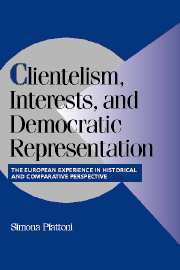 Clientelism, Interests, and Democratic Representation
Clientelism, Interests, and Democratic Representation Book contents
- Frontmatter
- Contents
- Contributors
- Preface
- 1 CLIENTELISM IN HISTORICAL AND COMPARATIVE PERSPECTIVE
- 2 WHY IS THERE NO CLIENTELISM IN SCANDINAVIA? A COMPARISON OF THE SWEDISH AND GREEK SEQUENCES OF DEVELOPMENT
- 3 PATRONAGE AND THE REFORM OF THE STATE IN ENGLAND, 1700–1860
- 4 CLIENTELISM IN THE BUILDING OF STATE AND CIVIL SOCIETY IN SPAIN
- 5 CONSTRAINTS ON CLIENTELISM: THE DUTCH PATH TO MODERN POLITICS, 1848–1917
- 6 MASS PARTIES AND CLIENTELISM IN FRANCE AND ITALY
- 7 FROM PATRONAGE TO CLIENTELISM: COMPARING THE ITALIAN AND SPANISH EXPERIENCES
- 8 CLIENTELISM IN A COLD CLIMATE: THE CASE OF ICELAND
- 9 CLIENTELISM, INTERESTS, AND DEMOCRATIC REPRESENTATION
- Bibliography
- Index
- More titles in the series
4 - CLIENTELISM IN THE BUILDING OF STATE AND CIVIL SOCIETY IN SPAIN
Published online by Cambridge University Press: 05 June 2012
- Frontmatter
- Contents
- Contributors
- Preface
- 1 CLIENTELISM IN HISTORICAL AND COMPARATIVE PERSPECTIVE
- 2 WHY IS THERE NO CLIENTELISM IN SCANDINAVIA? A COMPARISON OF THE SWEDISH AND GREEK SEQUENCES OF DEVELOPMENT
- 3 PATRONAGE AND THE REFORM OF THE STATE IN ENGLAND, 1700–1860
- 4 CLIENTELISM IN THE BUILDING OF STATE AND CIVIL SOCIETY IN SPAIN
- 5 CONSTRAINTS ON CLIENTELISM: THE DUTCH PATH TO MODERN POLITICS, 1848–1917
- 6 MASS PARTIES AND CLIENTELISM IN FRANCE AND ITALY
- 7 FROM PATRONAGE TO CLIENTELISM: COMPARING THE ITALIAN AND SPANISH EXPERIENCES
- 8 CLIENTELISM IN A COLD CLIMATE: THE CASE OF ICELAND
- 9 CLIENTELISM, INTERESTS, AND DEMOCRATIC REPRESENTATION
- Bibliography
- Index
- More titles in the series
Summary
Introduction
Spanish political history provides the opportunity to study the transition from patronage to clientelism by examining how state–society relations have altered during this transition and how politics as a linkage between state and society has also altered (Weingrod 1968). The particular way in which both the state and civil society have developed, and the interactions between the two, denote both the circumstances in which clientelism increases or declines as well as the type of clientelism present. State action is crucial to explaining how clientelist structures may be reinforced or weakened in two key ways: first, the type and extent of resources, in terms of public decision-making, that the state provides; second, the state's ability to enforce the rule of law and demonstrate its autonomy from class interests to counteract the inequalities inherent in civil society. These are the structural and institutional circumstances which Shefter draws attention to in his “supply side” account of patronage (Shefter 1994). The “demand side” of this account is provided by looking at civil society. Civil society is an important explanatory variable in terms of its ability to ensure state accountability and to provide a check and counterbalance to state activity. This depends on the extent to which citizens become economically and cognitively empowered to organize and form associations in civil society independently of both the state and political parties.
However, it is crucial to highlight the limitations of the liberal notion of civil society. First, the “free” and “equal” citizen postulated by liberalism tends, in reality, to be neither free nor equal.
- Type
- Chapter
- Information
- Clientelism, Interests, and Democratic RepresentationThe European Experience in Historical and Comparative Perspective, pp. 77 - 100Publisher: Cambridge University PressPrint publication year: 2001
- 7
- Cited by


